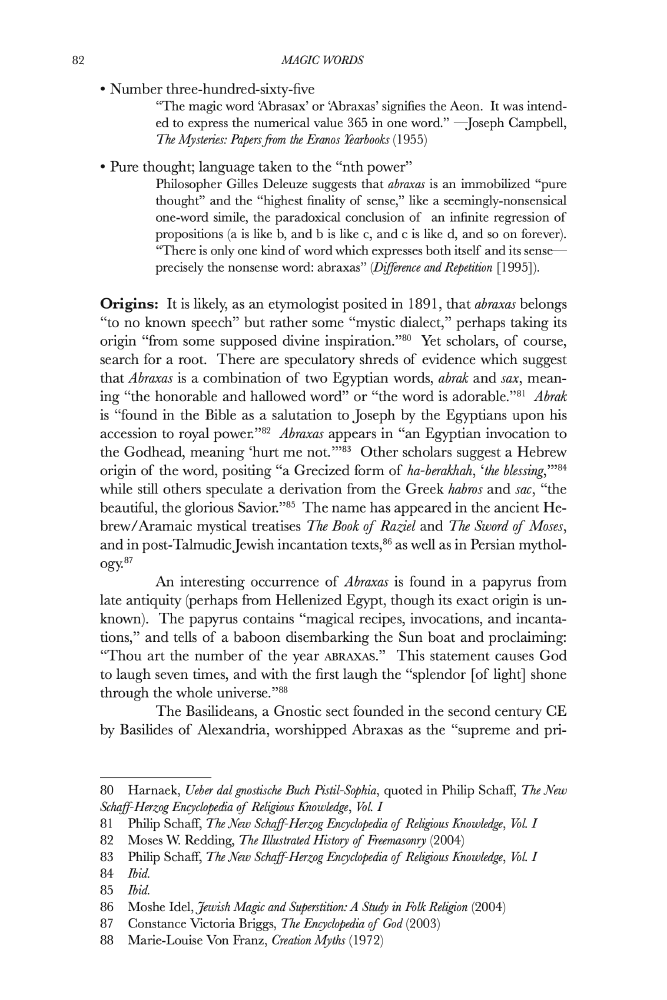
MAGIC WORDS
• Number three-hundred-sixty-five
"The magic word 'Abrasax' or 'Abraxas' signifies the Aeon. It was intended
to express the numerical value 65 in one word." -- Joseph Campbell,
The Mysteries: Papers from the Eranos Yearbooks (1955)
• Pure thought; language taken to the "nth power"
Philosopher Gilles Deleuze suggests that abraxas is an immobilized "pure
thought" and the "highest finality of sense," like a seemingly-nonsensical
one-word simile, the paradoxical conclusion of an infinite regression of
propositions (a is like b, and b is like c, and c is like d, and so on forever).
"There is only one kind of word which expresses both itself and its sense --
precisely the nonsense word: abraxas" (Difference and Repetition [1995]).
Origins: It is likely, as an etymologist posited in 1891, that abraxas belongs
"to no known speech" but rather some "mystic dialect," perhaps taking its
origin "from some supposed divine inspiration."80 Yet scholars, of course,
search for a root. There are speculatory shreds of evidence which suggest
that Abraxas is a combination of two Egyptian words, abrak and sax, meaning
"the honorable and hallowed word" or "the word is adorable."81 Abrak
is "found in the Bible as a salutation to Joseph by the Egyptians upon his
accession to royal power."82 Abraxas appears in "an Egyptian invocation to
the Godhead, meaning 'hurt me not.'"8 Other scholars suggest a Hebrew
origin of the word, positing "a Grecized form of ha-berakhah, 'the blessing,'"84
while still others speculate a derivation from the Greek habros and sac, "the
beautiful, the glorious Savior."85 The name has appeared in the ancient Hebrew/
Aramaic mystical treatises The Book of Raziel and The Sword of Moses,
and in post-Talmudic Jewish incantation texts,86 as well as in Persian mythology.
87
An interesting occurrence of Abraxas is found in a papyrus from
late antiquity (perhaps from Hellenized Egypt, though its exact origin is unknown).
The papyrus contains "magical recipes, invocations, and incantations,"
and tells of a baboon disembarking the Sun boat and proclaiming:
"Thou art the number of the year abraxas." This statement causes God
to laugh seven times, and with the first laugh the "splendor [of light] shone
through the whole universe."88
The Basilideans, a Gnostic sect founded in the second century CE
by Basilides of Alexandria, worshipped Abraxas as the "supreme and pri
80 Harnaek, Ueber dal gnostische Buch Pistil-Sophia, quoted in Philip Schaff, The New
Schaff-Herzog Encyclopedia of Religious Knowledge, Vol. I
81 Philip Schaff, The New Schaff-Herzog Encyclopedia of Religious Knowledge, Vol. I
82 Moses W. Redding, The Illustrated History of Freemasonry (2004)
8 Philip Schaff, The New Schaff-Herzog Encyclopedia of Religious Knowledge, Vol. I
84 Ibid.
85 Ibid.
86 Moshe Idel, Jewish Magic and Superstition: A Study in Folk Religion (2004)
87 Constance Victoria Briggs, The Encyclopedia of God (200 )
88 Marie-Louise Von Franz, Creation Myths (1972)